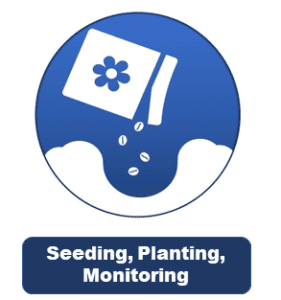Baughman, O.; Kulpa, S.; Sheley, R. 2022. Four paths toward realizing the full potential of using native plants during ecosystem restoration in the Intermountain West. Rangelands. 44(3): 218-226.
The Climate-Smart Restoration Tool is a GIS mapping program designed to help natural resource managers match seedlots with planting sites based on climatic information.
The Western Forbs: Biology, Ecology, and Use in Restoration project is designed to aid seed collectors, seed growers, nurserymen, landowners, restoration practitioners, and land managers as they increase the supply and use of native forbs.
Implementation of the SEEDS experimental restoration framework can move management options toward strategic treatments that increase project success, reduce the need for repeated treatments, and reduce costs. We will restore functional and resilient Great Basin ecosystems through, 1) experiments using local management and researcher knowledge, 2) monitoring a suite of integrated ecosystem processes, 3) determining…
Johnson, R.C.; Love, S.L.; Carver, D.; Irish, B.M. 2022. Using climate-driven adaptive evolution to guide seed sourcing for restoration in a diverse North American herb-shrub species. Restoration Ecology. 31(4): e13856.
Massatti, R.; Shriver, R.K.; Winkler, D.E.; Richardson, B.A.; Bradford, J.B. 2020. Assessment of population genetics and climatic variability can refine climate-informed seed transfer guidelines. Restoration Ecology. 28(3): 485-493.
Shaw, Nancy; Pellant, Mike. 2012. Great Basin Native Plant Selection and Increase Project: 2011 progress report. Boise, ID: U.S. Department of Agriculture, Forest Service, Rocky Mountain Research Station, Grassland, Shrubland and Desert Research Program. 212 p.
Barga, S.C.; Kilkenny, F.F.; Jensen, S.; Kulpa, S.M.; Agneray, A.C.; Leger, E.A. 2023. Not all seed transfer zones are created equal: Using fire history to identify seed needs in the cold deserts of the western US. Restoration Ecology. 31(8): e14007
Erickson, V.J.; Halford, A. 2020. Seed planning, sourcing, and procurement. Restoration Ecology. 28(S3): s219-s227. (Note: not funded by the GBNPP)
Jensen, S.L. 2020. Evaluating basin wildrye seed sources across provisional seed zones, native forb sowing depth on species performance and improving the accuracy of collection site and seed lot identification for big sagebrush. Provo, UT: Brigham Young University. Dissertation. 83 p.


